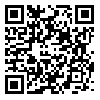Volume 11, Issue 44 (3-2005)
RJMS 2005, 11(44): 913-923 |
Back to browse issues page
Download citation:
BibTeX | RIS | EndNote | Medlars | ProCite | Reference Manager | RefWorks
Send citation to:



BibTeX | RIS | EndNote | Medlars | ProCite | Reference Manager | RefWorks
Send citation to:
Bayanzadeh S, Bolhary J, Dadfar M, Karimi Keisomi I. Effectiveness of Cognitive-Behavioral Religious - Cultural Therapy in Improvement of Obsessive-Compulsive Patients. RJMS 2005; 11 (44) :913-923
URL: http://rjms.iums.ac.ir/article-1-90-en.html
URL: http://rjms.iums.ac.ir/article-1-90-en.html
Abstract: (11255 Views)
This study was a comparative evaluation conducted to assess the effectiveness of cognitive-behavioral religious-cultural therapy in addition to medication treatment versus medication treatment alone and cognitive-behavioral therapy in addition to medication treatment in improvement of anxiety disorder (obsessive-compulsive). 15 obsessive-compulsive patients (5 males & 10 females) with religious background were randomly assigned into three groups: 1) Cognitive-behavioral religious-cultural therapy in addition to medication treatment (CBRCT, add. M), 2) Medication treatment alone (clomipramine or Fluoxetine), 3) Cognitive-behavioral therapy in addition to medication treatment (CBT, add. M). The subjects’ religious affiliation was determined by religious attitude questionnaire. All patients were evaluated before the commencement of treatment and, once again, eight weeks after the treatment by Beck Anxiety Inventory (BAI), Beck Depression Inventory (BDI), Yale-Brown Obsessive-Compulsive Scales, a checklist of obsessive behaviors, religious beliefs questionnaire and dysfunctional attitude questionnaire. The results were analyzed and further interpreted by chi-squared test(X2) and one-way analysis of variance (ANOVA). The results showed that both cognitive-behavioral religious-cultural therapy in addition to medication treatment and cognitive-behavioral therapy in addition to medication treatment were effective in reducing the severity of anxiety symptoms, depression, obsession, and dysfunctional beliefs and attitudes. Medication treatment alone was only effective in reducing symptoms of depression and obsession, while it was not effective in reducing anxiety or dysfunctional beliefs and attitudes. Cognitive-behavioral religious-cultural therapy in addition to medication treatment was more effective than medication treatment alone, but in comparison with cognitive-behavioral therapy in addition to medication treatment was less effective. Based on the statistical analysis of findings, the addition of religious cultural components to cognitive-behavioral therapy was not necessarily effective in improvement of religious patients with symptoms of obsessive- compulsive disorder however, the raw scores of improvement indices were higher in subjects receiving cognitive–behavioral religious-cultural therapy in addition to medication treatment than the other groups.
Type of Study: Research |
Subject:
Psychiatry





